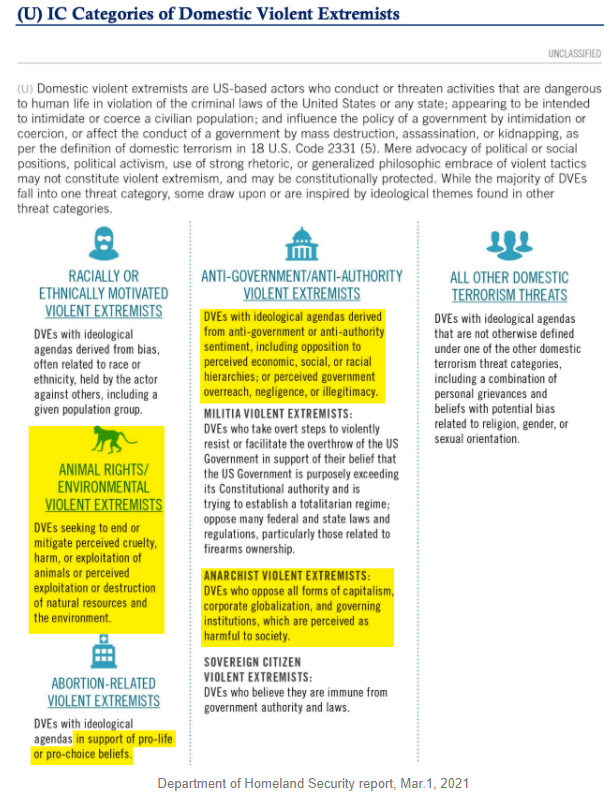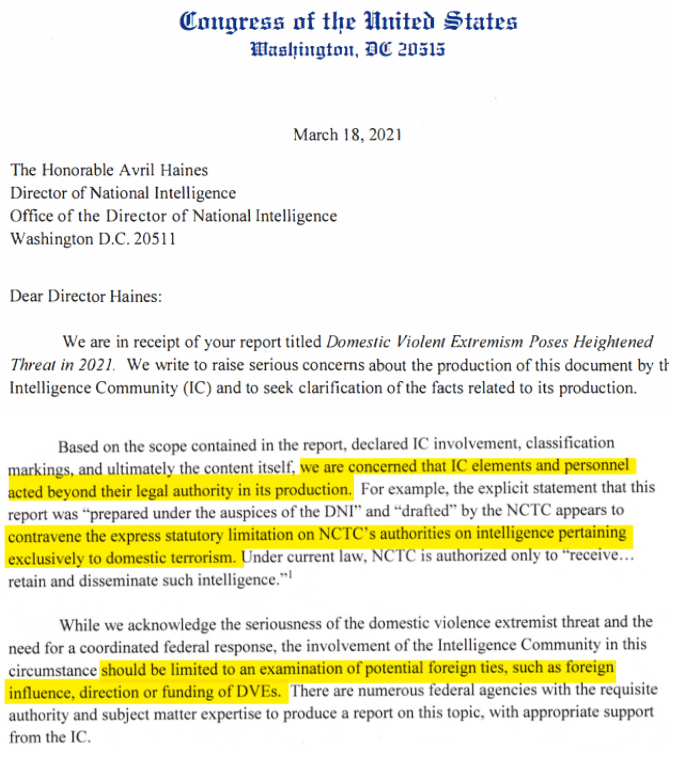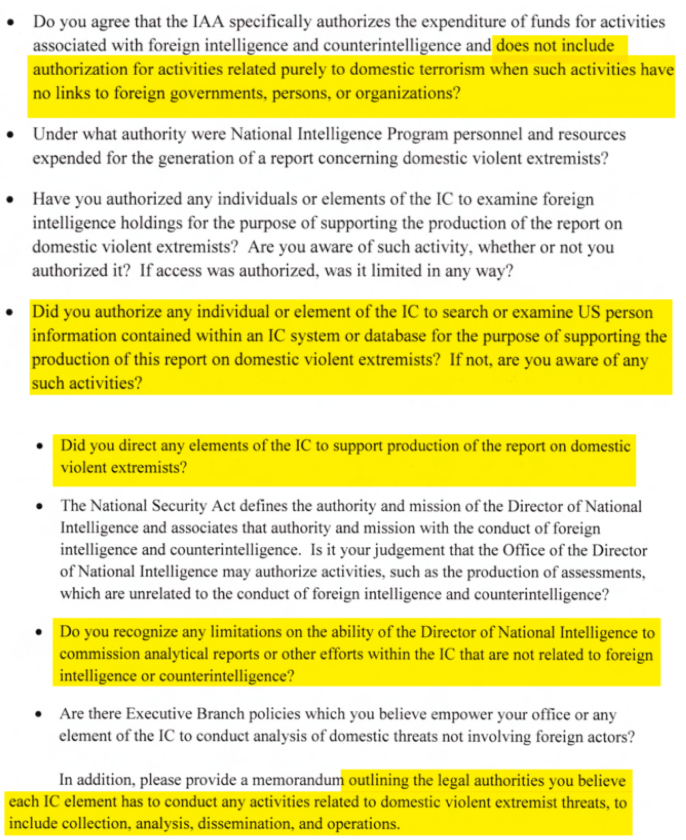
The U.S. Intelligence community, flouting laws, is increasingly involving itself in domestic politics
A report declassified last Wednesday by the Department of Homeland Security is raising serious concerns about the possibly illegal involvement by the intelligence community in U.S. domestic political affairs.
Entitled “Domestic Violent Extremism Poses Heightened Threat in 2021,” the March 1 Report from the Director of National Intelligence states that it was prepared “in consultation with the Attorney General and Secretary of Homeland Security—and was drafted by the National Counterterrorism Center (NCTC), Federal Bureau of Investigation (FBI), and Department of Homeland Security (DHS), with contributions from the Central Intelligence Agency (CIA) and the Defense Intelligence Agency (DIA).”
Its primary point is this: “The IC [intelligence community] assesses that domestic violent extremists (DVEs) who are motivated by a range of ideologies and galvanized by recent political and societal events in the United States pose an elevated threat to the Homeland in 2021.” While asserting that “the most lethal” of these threats is posed by “racially or ethnically motivated violent extremists (RMVEs) and militia violent extremists (MVEs),” it makes clear that its target encompasses a wide range of groups from the left (Antifa, animal rights and environmental activists, pro-choice extremists and anarchists: “those who oppose capitalism and all forms of globalization”) to the right (sovereign citizen movements, anti-abortion activists and those deemed motivated by racial or ethnic hatreds).
The U.S. security state apparatus regards the agenda of “domestic violent extremists” as “derived from anti-government or anti-authority sentiment,” which includes “opposition to perceived economic, racial or social hierarchies.” In sum, to the Department of Homeland Security, an “extremist” is anyone who opposes the current prevailing ruling class and system for distributing power. Anyone they believe is prepared to use violence, intimidation or coercion in pursuit of these causes then becomes a “domestic violent extremist,” subject to a vast array of surveillance, monitoring and other forms of legal restrictions:

Department of Homeland Security report, Mar.1, 2021
It goes without saying that violence of any kind — including that which is politically motivated — is a serious crime under U.S. law, and it is the proper role of the U.S. Government to investigate and prevent it. But there are real and important legal and institutional limits on the authority of the intelligence community to involve itself in domestic law enforcement, or other forms of domestic political activity, that seem threatened here, if not outright violated.
In particular, the Report’s acknowledgement that it was compiled by institutions including “the Department of Homeland Security (DHS), with contributions from the Central Intelligence Agency (CIA) and the Defense Intelligence Agency (DIA)” has alarmed numerous members of the House Intelligence Committee. On Thursday, all ten minority members of that Committee wrote a previously unreported letter to Director of National Intelligence Avril Haines “to raise serious concerns about the production of this document by the Intelligence Community (IC) and to seek clarification of the facts related to its production.”
Among the issues raised was that the DHS Report was not subject to the standard rigors of an intelligence community finding, yet continually makes sweeping claims that it prefixes with the authoritative phrase “the IC assesses.” The Committee members found this “to be misleading,” adding: we “urge you to clarify which elements in the IC concurred with this judgement and the intelligence basis, if any, for that concurrence.” In other words, Haines claims that these dubious assertions about various threats faced by Americans are the findings of the intelligence community when that is not true: just like the originally false claim widely spread by the media that “all seventeen intelligence agencies” endorsed the 2016 election findings about Russian interference when, in fact, it was only a few which had done so. Haines’ claims have support only from a few agencies as well.
But the more substantive danger is the role played by the CIA and other intelligence agencies in the domestic politics of the U.S., all in the name of fighting “domestic terrorism” (similar dangers were previously created by the Bush and Obama administrations in the name of fighting “international terrorism”). As the committee members’ letter details:

The Intelligence Committee members, citing the fact that the intelligence community is “subject to longstanding prohibitions against domestic activities,” then demanded answers to a series of questions based on this substantive concern:

Involvement of the intelligence community in the domestic activities of U.S. citizens is one of the most dangerous breaches of civil liberties and democratic order the U.S. Government can perpetrate. It was after World War II when the CIA, the NSA and other security state agencies that wield immense and unlimited powers in the dark were created in the name of fighting the Cold War. Legal and institutional prohibitions on wielding that massive machinery against the American public were central to the always-dubious claim that this security behemoth that operates completely in the dark was compatible with democracy. As the ACLU noted, “in its 1947 charter, the CIA was prohibited from spying against Americans, in part because President Truman was afraid that the agency would engage in political abuse.”
Since then, Truman’s fear has been realized over and over. Some of the worst post-WW2 civil liberties abuses have been the result of breaches by the CIA and other agencies of this prohibition. As the ACLU documents, the CIA in the 1960s was caught infiltrating and manipulating numerous domestic political activist groups. Under the auspices of the War on Terror, entire new bureaucracies (such as the Department of Homeland Security) and new legal regimes (such as the Patriot Act and the FISA Amendments Act) were designed to erode these long-standing limitations by dramatically increasing surveillance powers aimed at U.S. citizens. And by design, the infiltration of these security state agencies in U.S. domestic politics has dramatically escalated.
As the first War on Terror was escalating, The Washington Post — under the headline “CIA Is Expanding Domestic Operations” — reported in October, 2002, that “The Central Intelligence Agency is expanding its domestic presence, placing agents with nearly all of the FBI’s 56 terrorism task forces in U.S. cities.” The Post added that in the name of that War on Terror:

FBI Director Robert S. Mueller III recently described the new arrangement as his answer to MI5, Britain’s internal security service. Unlike the CIA, MI5 is empowered to collect intelligence within Britain and to act to disrupt domestic threats to British national security. “It goes some distance to accomplishing what the MI5 does,” Mueller told a House-Senate intelligence panel last week in describing the new CIA role in the FBI task forces.
In the years following, two NSA whistleblowers — William Binney and Edward Snowden — both cited their horror over the turning of the surveillance machinery against American citizens as the reason for their decision to denounce their agency. One of the aspects that most disturbed me about the Russiagate conspiracy theory from the start was that it was created and disseminated by the CIA and related agencies with the intent, first, to alter the outcome of the 2016 election, and then to undermine the elected president with whom they were at war. Shortly before Trump’s inauguration, Sen. Chuck Schumer (D-NY) went on The Rachel Maddow Show to warn — or more accurately: threaten — Trump that the CIA would destroy his presidency if he continued to criticize or otherwise oppose them:
It is encouraging to see Republican members of the House Intelligence Committee starting to express serious concerns over the dangers of intelligence community involvement in domestic politics. That is underscored by their approving citation to the mild mid-1970s reforms of the intelligence community ushered in by the Senate’s Church Committee, once primarily a liberal cause. Indeed, many of the same House Republicans who wrote this important letter to the DNI have in the past supported laws that allow greater involvement of the CIA, NSA and other agencies in activities on U.S. soil — including the Patriot Act.
The head of the Church Committee, Sen. Frank Church (D-ID), made clear in his iconic quote on Meet the Press in 1975 that those reforms were primarily motivated by fears that the U.S. Government would one day turn its vast intelligence powers onto the American people, rendering core civil liberties an illusion:

In the need to develop a capacity to know what potential enemies are doing, the United States government has perfected a technological capability that enables us to monitor the messages that go through the air. (…) We must know, at the same time, that capability at any time could be turned around on the American people, and no American would have any privacy left: such is the capability to monitor everything—telephone conversations, telegrams, it doesn’t matter. There would be no place to hide.
(That quote from Sen. Church was the first one that appeared in my 2014 book on the NSA reporting I did with Edward Snowden, and the title of that book, No Place to Hide, was a nod toward Church’s chilling warning, now come true).
As I have been repeatedly noting over the last two months, the Biden administration, along with leading Democrats such as Rep. Adam Schiff (D-CA), have been stating explicitly that one of their top priorities is the adoption of new laws designed to import the Bush/Cheney/Obama War on Terror onto U.S. soil for domestic purposes. As recently as February 14, The Washington Post — under the headline: “The agency founded because of 9/11 is shifting to face the threat of domestic terrorism” — noted that Rep. Bennie Thompson (D-Miss.), chairman of the House Homeland Security Committee, is now demanding that homeland security resources be re-directed toward domestic extremists, and “lawmakers of both parties spoke favorably of new legislation to specifically address domestic terrorism.”
Nobody from the Biden administration or Congressional members demanding enactment of Schiff’s proposed new “domestic terrorism” law can identify any activities that are not now criminal that they believe ought to be. Unless it is to permit intelligence agencies to start policing constitutionally protected speech and associational activities among U.S. citizens, why are any new laws needed? Unless it is to empower them to escalate their already-aggressive use of War on Terror tactics against U.S. citizens, what do they want security state agencies to be able to do on U.S. soil that they cannot now do?
But just as the fear of international terrorism was constantly inflated to place such questions off limits when it came to the War on Terror, and just as critics of the excesses of the first War on Terror were constantly accused of downplaying the threat of Islamic extremism if not harboring outright sympathy for it, the same tactics are being used now. Anyone raising civil liberties concerns about what is being done in the name of combating “domestic extremism” is vilified as ignoring and even supporting such domestic extremism.
No matter: there are few dangers more acute than the weaponization of these security state instruments against U.S. citizens for political ends. The DNI should provide full, complete and truthful answers to the important questions posed by these Intelligence Committee members, and should do so promptly. The evidence of growing incursions by the intelligence community in U.S. domestic politics is already strong and ample, and further incursions would be both dangerous and illegal.
Read more at: Greenwald.Substack.com and DomesticTerrorism.com.

